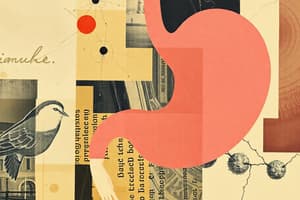Podcast
Questions and Answers
What is the major function of the gastrointestinal tract?
What is the major function of the gastrointestinal tract?
- Mechanical and chemical breakdown of food and absorption of digested nutrients (correct)
- Chemical breakdown of food only
- Absorption of digested nutrients only
- Mechanical breakdown of food only
Which part of the gastrointestinal tract initiates carbohydrate digestion?
Which part of the gastrointestinal tract initiates carbohydrate digestion?
- Mouth (correct)
- Stomach
- Esophagus
- Small intestine
What controls the functions of the gastrointestinal tract, except for swallowing and defecation?
What controls the functions of the gastrointestinal tract, except for swallowing and defecation?
- Extrinsic autonomic nerves (correct)
- Intrinsic autonomic nerves
- Voluntary muscles
- Intestinal hormones
What is the composition of the walls of the gastrointestinal tract?
What is the composition of the walls of the gastrointestinal tract?
Which part of the gastrointestinal tract transports food from the mouth to the stomach?
Which part of the gastrointestinal tract transports food from the mouth to the stomach?
What type of muscle is present in the upper part of the esophagus?
What type of muscle is present in the upper part of the esophagus?
What initiates the two phases of swallowing?
What initiates the two phases of swallowing?
What propels food through the gastrointestinal tract?
What propels food through the gastrointestinal tract?
Which phase of swallowing is involuntary?
Which phase of swallowing is involuntary?
Which part of the gastrointestinal tract is primarily responsible for digestion and absorption of nutrients?
Which part of the gastrointestinal tract is primarily responsible for digestion and absorption of nutrients?
Which type of nerves control the functions of the gastrointestinal tract?
Which type of nerves control the functions of the gastrointestinal tract?
What is the digestive component of saliva that initiates carbohydrate digestion?
What is the digestive component of saliva that initiates carbohydrate digestion?
What is the function of the lower esophageal sphincter?
What is the function of the lower esophageal sphincter?
Which nerve stimulates gastric secretion and motility?
Which nerve stimulates gastric secretion and motility?
What do gastric glands secrete for vitamin B12 absorption and food digestion?
What do gastric glands secrete for vitamin B12 absorption and food digestion?
Which organ is responsible for the production of bile necessary for fat digestion?
Which organ is responsible for the production of bile necessary for fat digestion?
What is the main function of the small intestine?
What is the main function of the small intestine?
Which hormones regulate gastric emptying and secretion?
Which hormones regulate gastric emptying and secretion?
What is the double layer of membranous tissue covering abdominal organs and the abdominal wall called?
What is the double layer of membranous tissue covering abdominal organs and the abdominal wall called?
Which phase influences acid secretion in the stomach?
Which phase influences acid secretion in the stomach?
What stimulates the liver, gallbladder, and pancreas for bile and enzyme release?
What stimulates the liver, gallbladder, and pancreas for bile and enzyme release?
What do enzymes from the small intestine and pancreas, along with bile salts, digest?
What do enzymes from the small intestine and pancreas, along with bile salts, digest?
What is the main function of the large intestine?
What is the main function of the large intestine?
Which hormone stimulates gastric secretion?
Which hormone stimulates gastric secretion?
Flashcards are hidden until you start studying
Study Notes
Digestive System Overview
- Lower esophageal sphincter functions to allow food into the stomach and prevent regurgitation.
- The stomach secretes digestive juices, mixes and stores food, and propels chyme into the duodenum.
- Vagus nerve stimulates gastric secretion and motility.
- Hormones such as gastrin, motilin, secretin, and cholecystokinin regulate gastric emptying and secretion.
- Gastric glands secrete intrinsic factor and hydrochloric acid for vitamin B12 absorption and food digestion.
- Acid secretion in the stomach is influenced by various factors and occurs in three phases.
- The small intestine is responsible for digestion and absorption of nutrients and water.
- The peritoneum is a double layer of membranous tissue covering abdominal organs and the abdominal wall.
- The duodenum receives chyme from the stomach and stimulates the liver, gallbladder, and pancreas for bile and enzyme release.
- Bile is produced by the liver, necessary for fat digestion, and aids in neutralizing chyme for enzyme action.
- Enzymes from the small intestine and pancreas, along with bile salts, digest proteins, carbohydrates, and fats.
- The large intestine absorbs water and electrolytes, has reflexes for motility, and houses the largest number of intestinal bacteria.
Studying That Suits You
Use AI to generate personalized quizzes and flashcards to suit your learning preferences.




